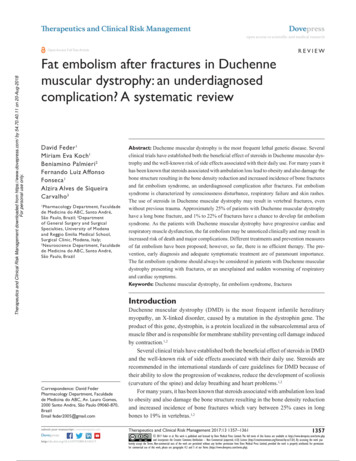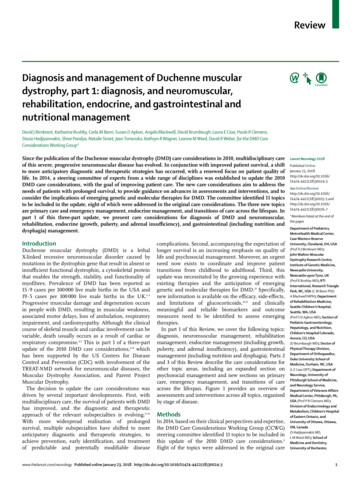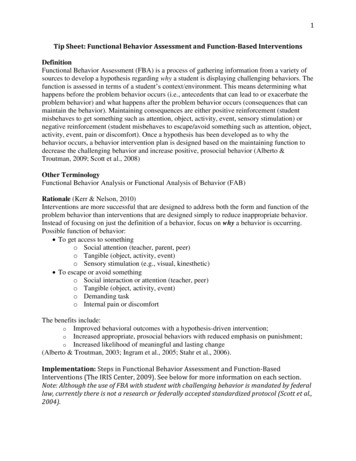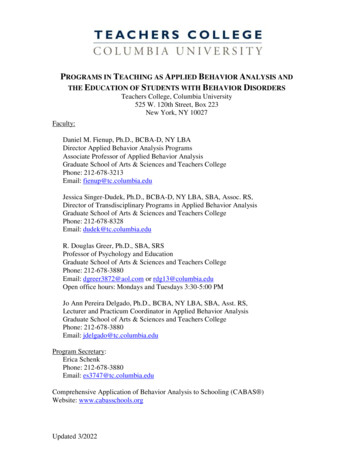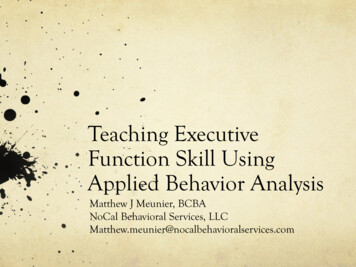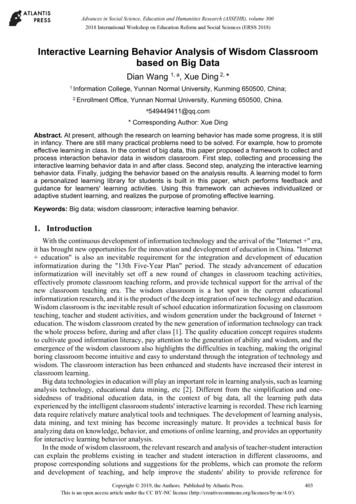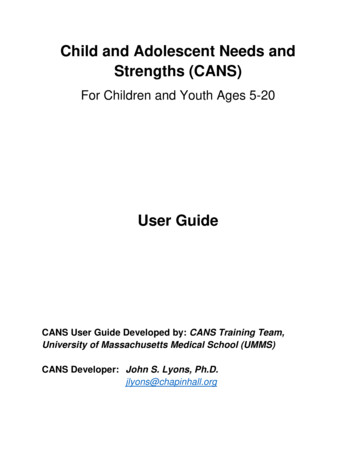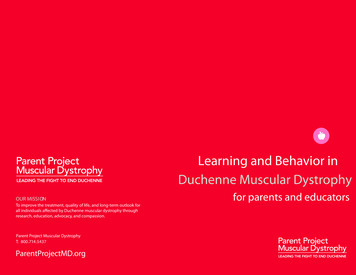
Transcription
Learning and Behavior inDuchenne Muscular DystrophyOUR MISSIONTo improve the treatment, quality of life, and long-term outlook forall individuals a ected by Duchenne muscular dystrophy throughresearch, education, advocacy, and compassion.Parent Project Muscular DystrophyT. 800.714.5437ParentProjectMD.orgfor parents and educators
Learning and Behavior inDuchenne Muscular Dystrophyfor parents and educators
contentsHow to Use this Guide1iiIntroduction to Learning and Behavior Concerns1.1 Learning and Behavior Summary481.2 Cognitive and Behavior Issues at Different Stages1.3 Assessment216Learning Issues and Interventions in Duchenne2.1 Overview of Intellectual Ability222.2 Language262.3 Attention, Listening, and Memory302.4 Executive Functioning342.5 Learning Disabilities38Behavioral and Emotional Adjustment in Duchenne3.1 Coping with Duchenne503.2 Depression and Anxiety543.3 ADHD583.4 Oppositional Explosive and Agression643.5 Autistic Spectrum Disorder74OUR MISSION3.6 Sensory Process Disorder78To improve the treatment, quality of life, and long-term outlookfor all individuals affected by Duchenne muscular dystrophythrough research, education, advocacy, and compassion.3.7 Obsessive Compulsive Disorder823.8 Social Interactions863Copyright by Parent Project Muscular DystrophyVersion 1, March 20114Recommended Resources5AppendixParentProjectMD.orgi
HOW TO USE THIS GUIDE:You are probably reading this because you are concerned aboutyour son’s behavior or learning, or because you want to beproactive in making his academic career as positive as it can be.In either case, you are looking for information, guidance andassistance on how to best serve his needs so that he has the sameopportunities for success as his peers. The purpose of this modulethat may arise in the classroom and at home.You should not automatically assume that all of the information inthis module will be relevant to your child. Like any other group ofchildren, among children with Duchenne you’ll find very differenttemperaments, behavioral patterns, and learning styles. Our hopeis that this module will increase awareness of potential problemareas, so that any difficulties can be identified early and addressedquickly. Research, clinical, and educational experienceprovide clues about behavior and learning issues that are morecommon in boys with Duchenne. This module reviews thoseissues, and potential interventions to improve your boy’s experiencein the classroom (and maybe at home).The best way for your child to have his needs met is for parents andprofessionals to come together in a collaborative manner. Pleaseuse this module, together with the other Education Mattersmaterials, as a starting point for assessing the needs of every youngperson with DMD and as a means of enhancing communicationbetween everyone involved.iieducation mattersAfter you read this guide and gather other information, considersetting up a meeting between parents and teacher (and otherschool personnel). This should ideally take place before the schoolyear starts. During the meeting, parents should take time to reviewrelevant behavioral or learning issues with the teacher. Point outrelevant learning and/or behavior issues and discuss how they arerelevant to your child. If your child has multiple needs in theclassroom, consider working with the teacher to prioritize whatshould be addressed first.Written by: James T. Poysky, PhDClinical Assistant Professor, Baylor College of Medicine, USAContributing Authors (in alphabetical order):Marni Axelrad, PhDAssistant Professor, Baylor College of Medicine, USAMorgan Bender, BASpecial Education Teacher, Rise School, USALiza Bonin, PhDAssistant Professor, Baylor College of Medicine, USAJill CastleRaising Special Kids, USAJos Hendriksen, PhDPediatric Neuropsychologist, Kempenhaeghe Epilepsy Center, NetherlandsVeronica J. Hinton, PhDAssistant Professor of Neuropsychology, Columbia University, USAKelli Miller, M EdEducational Consultant, San Diego, CAa note to parents and professionalsiii
In this section:Dystrophin is usually present in the brain as well as in the muscles,and scientists think that when dystrophin is missing (as in DMD),brain neurons may not function as efficiently as they should.This is probably why there is an increased chance fordevelopmental, cognitive, learning, and behavioral difficultiesamong boys with DMD. Not every child with DMD is going tohave problems with learning or behavior.1.1 Learning and Behavior Summary1.2 Cognitive & Behavioral Issues atDifferent Stages1.3 AssessmentSection 1:Introduction to Learningand Behavioral ConcernsMore Common in Childrenwith Duchenne Muscular Dystrophyintro to learning & behavioral concerns2
1.1Learning and Behavior Summary
1.1 Learning and Behavior SummarySimilar to other kids, boys with DMD can have a broad range of IQ scores(including well above average), and most boys are in the “normal” rangeof intellectual and learning ability. However, boys with DMD are morelikely to have somewhat lower IQ and academic test scores than otherchildren their age. There is an increased, though low, risk ofmental retardation (which means an IQ below 70 and a reduced abilityto live independently).Boys with Duchenne may have problems with motor planning,which is separate from issues related to their muscle weakness.Problems with motor planning may cause a child to appearclumsy, uncoordinated, or as having poor hand-eye coordination.Problems with short-term verbal memory (also called working memory)are the most common finding, and can be present even in children with ahigh IQ. This has an impact on the amount of information boys can takein and hold in mind at any one time.behavior, and sensory processing disorder.Language development can be problematic for children with Duchenne,including language comprehension and expression. Basic vocabulary isless likely to be affected.Weaknesses in phonological (the distribution and pattern of speechsounds) awareness/processing, combined with problems in short-termverbal memory, can increase the chance for a learning disability. This isprobably why the rate of dyslexia (reading problems) may be as high as40% in boys with Duchenne.Writing and mathematics disorders are less well studied, but evidencesuggests that they can also be problematic.5education mattersThere is also an increased chance for neurodevelopmentalSome boys may appear to have obsessive-like features, and maythought process to accomodate changes in expectations orcircumstances).Boys with Duchenne also have an increased chance for emotionalproblems such as anxiety or depression, similar to what is seenin other chronic medical conditions.problems (e.g., making and maintaing same-age friendships,social maturity, etc.). This may be due in part to physicallimitations, but may also be because of cognitive weaknessesin social judgement, social reciprocity, and perspective taking.Learning and Behavior Summary6
The following section is broken into age andgrade categories.1.2Cognitive & Behavioral Issuesat Different Stages
Cognitive:Parents and teachers may notice concerns about languagedevelopment during this age period. The problem may beobvious, such as a lack of basic vocabulary, or may be subtle,in that they have a normal vocabulary but problemsremembering or processing larger amounts of verbalinformation or expressing themselves. Weaknesses inphonological awareness and verbal memory place boyswith Duchenne at increased risk for developing learningdisabilities, especially dyslexia.Behavior:pre-k, kindergarten & earlyelementary (ages 1–7)Problematic behaviors are quite common in all preschoolchildren, and boys with DMD are no different. However,young boys with DMD may have more difficulty with impulsivityand emotional control than other children their age. They arealso more likely to be rigid and inflexible in their thinking,which can result in noncompliance or arguing. They mayhave difficulty making transitions. They may also be takingsteroid medication with side effects that can impact theirbehavior, such as making them more emotional and activethan normal.10
Cognitive:Difficulty mastering academic material is a frequent concernduring the primary years. Academic difficulties may be due tospecific learning disabilities such as dyslexia or other cognitivedeficits. Problems with short-term memory and attention maybe problematic for boys with DMD at this stage, but may beoverlooked by parents and teachers because they are notdisruptive. As boys progress through the grades and moreand more independence is expected in their work, problemswith planning, organization, initiation and self-evaluation maybecome more apparent (these types of skills are collectivelyreferred to as “executive skills”).Behavior:elementary & middle school(ages 7–11)Children with DMD tend to become more aware of theirdifferences and limitations during this stage. Although mostboys adjust well to their condition over time, there may betimes of emotional distress because of DMD. Boys age 8 to10 years may be most likely to have adjustment problems, asthis is usually the time just prior to transition to regular use ofa wheelchair.12
Cognitive:As young men with DMD grow older and expectations forresponsibility increase, problems with short-term memoryand executive functioning can interfere with their ability tokeep track of and efficiently complete assignments andprojects. This is likely to become more problematic as thecomplexity of their work increases, and for this reasonlearning problems can happen for the first time during thisage range.Behavior:junior high & high school(ages 12-18)As with any child, adolescence may be a difficult time foryoung men with DMD. Physical limitations and disruptionin physical development that may occur with some medicaltreatment (e.g., short stature or delay of puberty from steroidtreatment) may make adolescence more problematic. Thiscan also be a difficult time for teens who are unable toestablish their independence because they require more careand assistance from others, such as parents. As muscle weaknessprogresses, they are at risk for becoming more isolated orsocially withdrawn. Parents and teachers should look forsigns of chronic sadness, depression, or anxiety.14
1.3Assessment
1.3 AssessmentGiven the increased risk of cognitive and emotional problems inDMD, we suggest early assessment and intervention. Someassessments should be done for all children with DMD (as describedon right). Other assessments can be done if concerns arise. Given thecomplex nature of DMD, assessments should be done by people withexpertise that is appropriate to the methods of assessment. Sometimesthe expertise offered by your local school isn’t enough for your child’sinitial assessment. If possible, it is best to visit a child neuropsychologist,but other child psychologists also offer appropriate assessment services.Parents and Teachers – Please raise any concerns that you mighthave about the child’s development, cognitive ability, academicprogress, emotional adjustment, or behavior as soon as possible.Please do not wait to see if the child will grow out of it! In general,the earlier you start interventions the more successful they will be.17education mattersRecommended learning & behavior assessmentsfor children with DuchenneScreening for autism spectrum disorder Timing: between 2 and 3 years of ageDyslexia screening Timing: If concerns ariseComprehensive neuropsychological evaluation Timing: Kindergarten or 1st grade, or in responseto concerns or change in school functioning Areas assessed may include, but are not limitedto, IQ, language, visual processing, fine motorskills, memory, attention/impulse control,executive functioning (e.g., planning, problemsolving, initiation, mental flexibility), academicskills, academic processes (e.g., phonologicalawareness), and behavior/emotional adjustment.1.3 Assessment18
In this section:While scientists are still figuring out the exact role of dystrophinin the brain, not having dystrophin seems to cause an increasedrisk for specific cognitive weaknesses and learning difficulties.This does not mean that all boys with Duchenne will have deficitsin these areas.Parents are STRONGLY encouraged to seek assistancefrom appropriate professionals if concerns ariseregarding any of these problem areas.2.1 Overview of intellectual ability2.2 Language2.3 Attention, listening, and memory2.4 Executive functioningSection 2:2.5 Learning disabilitiesLearning Issuesin Duchennelearning issues in Duchenne20
2.1Overview of Intellectual Ability
2.1 Overview of Intellectual AbilityBoys with DMD are at increased risk for developmentaldelays. The most common delays are in gross motorskills such as sitting, walking and running. However,boys with DMD are also at increased risk for delays inother areas such speech/language development, motorplanning, and fine motor dexterity. Some boys arelater than usual in potty-training and self-help skills.Similar to the general population, IQ scores in DMDcan range from well above average to below average.Most boys with DMD have an IQ that is in the normalrange. However, they are also at increased risk forhaving an IQ that is below average or in the mentalretardation range (IQ score less than 70). Boys withDMD may also have a specific pattern of cognitivestrengths and weaknesses (as described below) thatmay not be accurately represented in an overall IQscore. Thus, educators and parents should take carewhen interpreting IQ scores for DMD boys.Interventions for Developmental Delays:Interventions for developmental delays (e.g., speech/language, physical, and occupational therapies) typicallyinvolve various therapies and should be targeted onimproving specific skills. Children with intellectualimpairment will need significantly more repetition,rehearsal, and practice to learn new academicinformation. Specific interventions are described inthe sections that follow.boys with Duchenneface an increased riskfor developmentaldelays23education matters2.1 overview of intellectual ability24
2.2Language
2.2 LanguageBoys with Duchenne usually have a vocabulary that is in thenormal range, but may have more trouble with other languageskills. An area of weakness may be understanding complex verbalinformation. Because of this, boys with Duchenne may havedifficulty understanding expectations or following directions,and may only get “part of the message”. Boys with Duchennemay also have difficulty with expressive language. This caninterfere with their ability to describe their ideas and ask questions.Teachers should note that, because their basic vocabulary is usuallyin the normal range, boys with Duchenne may give the impressionthat their level of understanding is higher than it actually is.Phonological processing skills are an area of language that canbe particularly problematic for boys with DMD. Goodphonological processing is a prerequisite for the developmentof reading skills, and problems in this area place a child at riskfor the development of dyslexia. [See the Learning Disabilities:Dyslexia section for more information about phonologicalprocessing.]27education mattersInterventions for language:Speech and language therapy is usually recommended for achild with deficient language skills. The therapy should focuson improving skills that were shown to be weaker by thechild’s testing. Consider simplifying communication wheninteracting with a boy who has language delays. Childrenwith weaknesses in this area may have difficulty withopen-ended questions (“Why did you do that?”), and tendto do better with yes/no questions or limited response options.Ways to Simplify Communication: use concrete and clear terms and phrasesadjust the vocabulary you usegive smaller chunks of informationintroduce only one new direction/concept at a timehave them explain things in their own words2.2 language28
2.3Attention, Listening, and Memory
2.3 Attention, listening, and memoryIf given repeated exposure, boys with DMD are generally able tomemorize the same amount of new information as other children.However, the amount of information that they are able to take inat any one time may be less than other children. This type ofmemory is called short-term memory, or working memory. Boyswho have problems in this area may appear forgetful, have difficultyfollowing directions, or seem to not listen. These memoryweaknesses are particularly related to verbal information, but someboys also have difficulty with visual information. Even boys withDMD who have a high IQ and strong verbal skills can have thispattern of memory weaknesses.Boys with DMD have an increased chance for problems with attention,concentration, and distractibility. They may also be “inefficient” in theamount of time it takes them to work through things (slow processingspeed), and may have difficulty dividing their attention (multi-tasking).Examples of interventions for attention,listening, and memory problems: education mattersInstructions should be broken down into individual steps,which are provided one at a time.Break down new information into smaller chunks, andcheck for understanding before moving on. Consider eliminating time constraints for tests and giveextra time for assignments. Provide a quiet, non-stimulating environment for testtaking or completing assignments, outside of the classroomif necessary. Develop a reward system to aid in work perseverance.This should focus on rewarding positive on-task behaviors,rather than punishing off-task behaviors. Provide advanced warning of transitions (e.g. “Two minutesuntil ”). Provide clear expectations and remain calm, firm, positive,and encouraging. Keep the classroom well organized, structured, and controlled. Summarize information at the end of each instructional lessonto assist with synthesis, organization, and retention of theinformation.For related information, see the section on ADHD.31Provide seating near the instruction area.If the child can’t sit still, allow him to stand when working.2.3 attention, listening, and memory32
2.4Executive Functioning
2.4 Executive Functioningsome boys have issuesResearch studies have been inconsistent, but there isevidence that some boys with DMD have problems withexecutive functioning. This is a term used to describeskills that are needed to complete goal-oriented behaviors,including things like planning, organization, initiation,mental flexibility, and self-analysis. Mental flexibility inparticular appears to be more problematic in DMD than inthe general population. Boys with problems in this areawill have difficulty adapting to changes in expectations orrequirements, or in transitioning from one activity to thenext. They can get stuck on one idea, and have a hard timeshifting their thinking away from it, even when others aregetting annoyed or angry with them. They may appearstubborn or hard-headed, but it is important to keep inmind that this reflects a cognitive weakness rather than acharacter flaw. Problems with executive functioningcommonly occur in the presence of ADHD and autism.with goal-orientedbehaviors and2.4 executive functioning36
2.5Learning Disabilities
iDyslexia2.5 Learning DisabilitiesAlthough research has predominantly looked at reading, there isevidence that suggests that children with DMD are at increasedrisk for all three types of specific learning disabilities: Dyslexia (reading disorder) Dyscalculia (mathematics disorder) Dysgraphia (written communication disorder)Dyslexia is not a visual problem. It is a problem with soundsegmentation and sound-blending while reading. Thus, the mosttelling sign of dyslexia is when a child has difficulty sounding-outwords. Dyslexia is a specific learning disability that results in difficultylearning to read. Although there are a number of differentfactors that can play a role, research indicates that dyslexia ismostly caused by deficits in the following foundational skills:Phonological processing:Understanding that spoken words aremade of up small sounds (phonemes)that are blended together, and thatthese sounds can be identified andmanipulated.Verbal memory span/working memory:Verbal memory span, also called verbalshort-term memory, represents theamount of new information you canhold in mind at one time. Workingmemory refers to the ability to keepinformation in mind and manipulate it.Rapid naming:This refers to how quickly and efficientlysomeone is able to find and retrieveinformation from memory. Withsufficient practice, the retrieval of someinformation should become “automatic”.Research has demonstrated that specific deficits in verbalmemory span/working memory and phonological processingare prevalent in DMD, and can occur across all IQ levels.39education matters2.5 Learning Disabilities40
Signs of Dyslexia:Preschool Difficulty with rhyming Problems identifying thestarting/ending soundsof spoken words Difficult or inconsistentidentification of letternamesElementary Beyond Problems learning/rememberingletter sounds Difficulty segmenting (“soundingout”) written words Difficulty blending soundstogether to make words Looking at the first or last soundin a word and guessing at the rest Dropping word endings whilereading (“slow” instead of “slowly”) Difficulty with spelling Slow, laborious, or “dysfluent” reading Poor reading comprehensionComments on Dyslexia Interventions Just telling a child with dyslexia to “read more” is not effective;research has shown that independent reading by itself doesnot correct the disorder. Research also indicates that themost effective way to correct dyslexia is repetitive, intensivephonics instruction. Be patient with the child when attempting to teach reading skills.For children who struggle with dyslexia, it will be a long process thatrequires lots of repetition and encouragement to build confidenceand skills.Compensatory strategies for dyslexiaDespite intervention, some children may continue to havedifficulty reading. Compensatory strategies do not “treat”the underlying problem like interventions do, but they maymake it easier for a child who is experiencing dyslexia tosucceed in the classroom. Below are modifications that teachersmay need to make. Oral presentation of new information that the studentwould otherwise have to read Allowing the use of books on tape when available, orallowing someone to read the material to the child Oral presentation and responding during tests andassignments, either in person or via use of a tape recorderor voice recognition software Allowing extra time for the completion of assignments Some people think that sight-word memorization is a goodstrategy for children with reading problems (teaching them torecognize the word based on how it looks, not on sounding itout). The problem is that they tend to max out at around3000-5000 words, which is far short of the number needed forfluent reading. Phonological awareness and phonics instructionmust be an integral part of the process. Children with dyslexia will forget the reading skills they havelearned if they are not reinforced or repeated. Thus, good readingprograms build upon and reinforce previously learned skills, ratherthan switching to a different task or skill. Ongoing practice andreview of previously learned steps will be necessary.41education matters Removing time limits on testsbe patient with thechild when attemptingto teach readingskillsspecific challenges & ways you can help (ages 7–11)42
iDyscalculia (Mathematics Disorder)There are two general areas of weakness that can contribute toproblems with mathematics. One is a weakness in mathematicalreasoning ability, which results in difficulty understanding mathconcepts. Children with problems in this area may have difficultyestimating amounts, understanding relative value (greater than,less than), or understanding abstract or symbolic concepts inmath ("ten's place, hundred's place", money, fractions, etc.).Another general area of weakness that can contribute to problemswith mathematics is memory for arithmetic operations. Childrenwith problems in this area have difficulty remembering numberfacts (e.g., multiplication tables), sequences/steps used in mathproblems, or computing easy calculations in their head. Somechildren may demonstrate problems in just one of these generalareas, while others may have difficulty in both areas.Interventions for DyscalculiaMath ConceptsChildren who are having difficulty understanding mathconcepts will benefit from an increase in the use oftangible objects and “real-life” examples when learning.Numerical OperationsFor a child to become proficient at numerical operationsrequires several things, including rote memorization ofmath facts (e.g., counting/sequencing for young children,multiplication tables for older children) and memorizationof math procedures (e.g., strategies or steps to completea problem).Compensatory StrategiesCompensatory strategies do not “treat” the underlying problem likeinterventions do, but they may make it easier for a child who isexperiencing dyscalculia to succeed in the classroom. Examples include: Provide plenty of workspace for each problem on tests andassignment sheets. Place steps for completing the problem at the top of the pageor on an index card, and list steps vertically, from top to bottom. Allow use of a number line. Allow use of a math facts table or calculator. Allow extra time for tests and assignments. Consider reducing the number of problems; focus on quality vs.quantity if an assignment will be graded.43education mattersdyscalculia & interventions44
iDysgraphia (Disorder of Written Expression)Writing is perhaps the most difficult academic task to master, as itrequires the successful integration of a number of skills. Problemswith muscle strength, fine motor dexterity, or motor planning canmake the physical aspect of writing difficult and frustrating forsome children. Children who have problems with language skillscan have difficulties with spelling, grammar and syntax. Weaknessesin executive functioning can result in difficulty starting, planningand organizing longer written projects.Interventions for Dysgraphia:Fine motor dexterity or motor planning: Occupational therapy to improve pencil control skills Structured repetitive handwriting programs that teachstrategies to form letters (for example, “HandwritingWithout Tears”)Spelling Problems: These are usually related to weakness in phonologicalprocessing. Target interventions to the aspects ofspelling that children are problematic for the childhaving problems.For example:- Instruction in clapping/counting syllables- Instruction in basic spelling rules (each word musthave a vowel, “I before E, but not after C”, etc.)- Instruction in word segmentation and blending Memorization of common words that are exceptionsto spelling rules45education mattersLanguage Weaknesses: Limited vocabulary and difficulty with expression (suchas grammar or sentence formation) may contribute towriting problems.Compensatory StrategiesCompensatory strategies do not “treat” the underlying problem likeinterventions do, but they may make it easier for a child who isexperiencing dysgraphia to succeed in the classroom. Examples include: Reduce paper and pencil tasks and decrease repetitive writingassignments, but do not change essential elements. For older students, accompany writing assignments with veryspecific steps and instructions, sequential outlines, etc. Provide copies of slides, teacher notes, and lecture outlines so thestudent is not missing important information while trying to take notes.When the student is given notes/outlines, require some activity of thestudent in order to maintain his active participation in the learning process,such as highlighting key words with a highlighter. Provide an opportunity for oral responses on tests or assignmentsand/or allow dictation. Do not provide a handwriting or neatness grade. Allow the use ofcursive or printing, whichever is more legible. Allow for use of AlphaSmart or other keyboarding system. Do not grade for spelling, grammatical, or punctuation errors duringone-sitting assignments. Modify test formats to increase structure. For example, instead of ageneral essay question, provide testing in multiple-choice, true-false, orfill-in-the-blank formats.dyscalculia & interventions46
In this section:While scientists are still figuring out the exact role of dystrophinin the brain, not having dystrophin seems to cause an increasedrisk for specific cognitive weaknesses and learning difficulties.This does not mean that all boys with Duchenne will have deficitsin these areas.Parents are STRONGLY encouraged to seek assistancefrom appropriate professionals if concerns ariseregarding any of these problem areas.3.1 Coping with Duchenne3.2 Depression and anxiety3.3 ADHD3.4 Oppositional, explosive, and aggressive behavior3.5 Autistic Spectrum DisordersSection 3:3.6 Sensory Processing Disorder3.7 Obsessive-compulsive behaviors3.8 Social InteractionsBehavior & emotionaladjustment inDuchennecognitive and learning issues in Duchenne48
3.1Coping with Duchenne
3.1 Coping with DuchenneMost boys with Duchenne cope well with their medical conditionand are described as emotionally well-adjusted. However,keep in mind that even well-adjusted boys may experiencefrustration, sadness, anger, or anxiety related to their Duchenne.These are normal reactions to a stressful situation, and aremore likely to be triggered during important developmentalperiods or times of change.51education mattersWays to help maximize coping Be available to talk with the child or with others about Duchenne. Help identify and address any specific cognitive or learningdifficulty that is causing the child difficulty. Adjust the classroom setup and activities to maximize inclusionand participati
problems such as anxiety or depression, similar to what is seen in other chronic medical conditions. problems (e.g., making and maintaing same-age friendships, social maturity, etc.). This may be due in part to physical limitations, but may also be because of cognitive weaknesses in social judgement, social reciprocity, and perspective taking.
